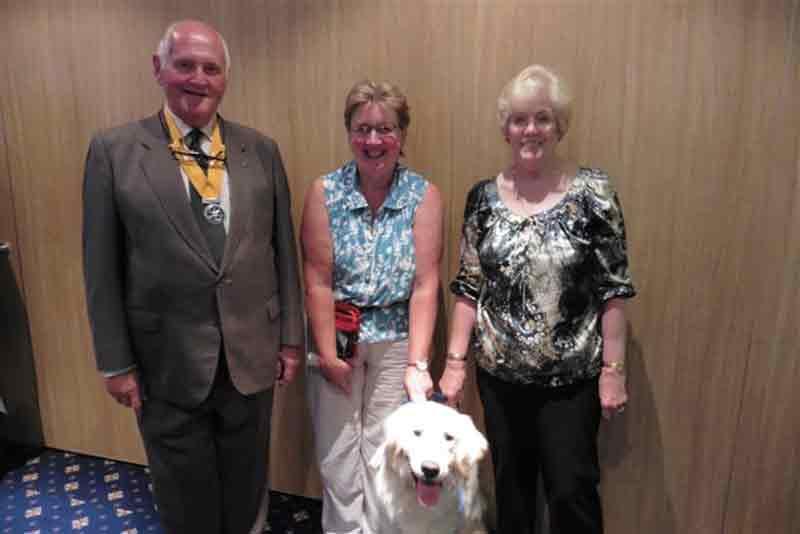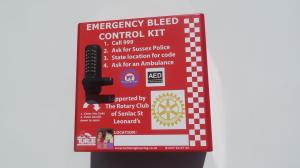Guide Dogs for the Blind
Wed, Jul 15th 2015 at 7:00 pm - 10:00 pm

A person does not have to be totally blind to be able to have a guide dog. So explained Barbara Grice, the fund raiser for the Bexhill, Hastings and Rother branch of the Guide Dogs for the Blind Association. Any person who is visually impaired may qualify. Barbara was joined by Julia Delibero, a puppy walker, and Hudson, a Labrador in training for the job of a guide dog, when she spoke at the Rotary Club of Senlac.
The Association is a charitable organisation which receives no government funding and is totally reliant on donations, legacies and fund raising. The association exists not just to provide guide dogs but also to campaign for the rights of the visually impaired. It is seeking a society in which blind and partially sighted people can enjoy the same freedom of movement as everyone else.
The use of guide dogs dates back to the First World War when soldiers blinded in action, particularly through exposure to mustard gas, were given dogs to help them. Training has changed since then with the establishment of a state of the art breeding centre at Leamington which opened in 2011. At around 12 weeks old, the puppy will be given to a puppy walker such as Julia to gain experience of the walker’s world, socialising with other dogs and learning discipline. After a year they will undergo more intensive and specialised training to carry out their eventual role. There is, in fact, a 25 per cent failure rate but dogs are not “failures” because they will be offered to other organisations such as Hearing Dogs, forces search dogs or Buddy Dogs to help children with specialist needs. There are currently nearly 5000 guide dogs working in the UK which are supported totally by the Association with only 50p being asked from the handler. Over the six year working life of a dog this amounts to some £50,000.
The Association have recently been instrumental in changes to the law relating to dangerous dogs. On average eight guide dogs a week are attacked by other dogs and these attacks alone cost the Association over £100,000 a year. Electric cars are another hazard because they make no noise for the dogs to hear. They are campaigning, too, for Access for All to try to improve acceptance for guide dogs everywhere; some taxis are reluctant to take a dog, as are some venues. There is also a cultural issue as members of one religion see dogs as “unclean” and will not allow them onto their premises. However, soon, all guide owners will carry a card which sets out their rights to enter.
Senlac Rotary vice-president, Glyn Parry, who was in the chair, gave a vote of thanks for the interesting and illuminating talk from the Guide Dogs for the Blind team.'What We Do' Main Pages:


.jpg)



